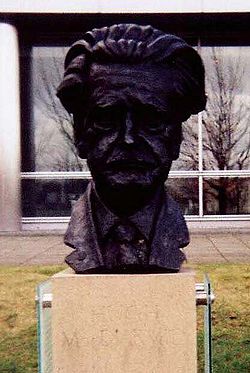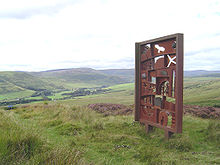- Hugh MacDiarmid
-
Christopher Murray Grieve 
A bust of MacDiarmid in South Gyle, EdinburghBorn 11 August 1892
Langholm, ScotlandDied 9 September 1978
Edinburgh, ScotlandPen name Hugh MacDiarmid Occupation Poet Literary movement Scottish Renaissance Hugh MacDiarmid is the pen name of Christopher Murray Grieve (11 August 1892, Langholm[1] – 9 September 1978, Edinburgh[2]), a significant Scottish poet of the 20th century. He was instrumental in creating a Scottish version of modernism and was a leading light in the Scottish Renaissance of the 20th century. Unusually for a first generation modernist, he was a communist; unusually for a communist, however, he was a committed Scottish nationalist. He wrote both in English and in literary Scots (often referred to as Lallans).
Contents
Early life and writings
After leaving school in 1910, MacDiarmid worked as a journalist for five years. He then served in the Royal Army Medical Corps during the First World War. After the war, he married and returned to journalism. His first book, Annals of the Five Senses (1923) was a mixture of prose and poetry in English, but he then turned to Scots for a series of books, culminating in what is probably his best known work, the book-length A Drunk Man Looks at the Thistle. This poem is widely regarded as one of the most important long poems in 20th century Scottish literature. After that, he published several books containing poems in both English and Scots.
Politics
In 1928, MacDiarmid helped found the National Party of Scotland. He was also a member of the Communist Party of Great Britain. During the 1930s, he was expelled from the former for being a communist and from the latter for being a nationalist. In 1949, George Orwell compiled a list of suspected communist sympathisers for British intelligence. He included MacDiarmid in this list. In 1956, MacDiarmid rejoined the Communist Party.
As Grieve, he stood in the 1950 election in the Glasgow Kelvingrove constituency, as the Scottish National Party candidate, coming last with 639 votes. He also stood against Alec Douglas-Home in Kinross and Western Perthshire for the Communist Party at the 1964 election, taking only 127 votes. MacDiarmid listed Anglophobia amongst his hobbies in his Who's Who entry.
In 2010, letters were discovered showing that he believed a Nazi invasion of Britain would benefit Scotland. In a letter sent from Whalsay, Shetland, in April 1941, he wrote: “On balance I regard the Axis powers, tho’ more violently evil for the time being, less dangerous than our own government in the long run and indistinguishable in purpose." A year earlier, in June 1940, he wrote: “Although the Germans are appalling enough, they cannot win, but the British and French bourgeoisie can and they are a far greater enemy. If the Germans win they could not hold their gain for long, but if the French and British win it will be infinitely more difficult to get rid of them.” Marc Horne in the Daily Telegraph commented: "MacDiarmid flirted with fascism in his early thirties, when he believed it was a doctrine of the left. In two articles written in 1923, Plea for a Scottish Fascism and Programme for a Scottish Fascism, he appeared to support Mussolini’s regime. By the 1930s however, following Mussolini’s lurch to the right, his position had changed and he castigated Neville Chamberlain over his appeasement of Hitler’s expansionism." [3]Deirdre Grieve, MacDiarmid’s daughter-in-law and literary executor, noted: “I think he entertained almost every ideal it was possible to entertain at one point or another." [3]
Later writings
As his interest in science and linguistics increased, MacDiarmid found himself turning more and more to English as a means of expression so that most of his later poetry is written in that language. His ambition was to live up to Rilke's dictum that 'the poet must know everything' and to write a poetry that contained all knowledge. As a result, many of the poems in Stony Limits (1934) and later volumes are a kind of found poetry reusing text from a range of sources. Just as he had used Jameson's dialect dictionary for his poems in 'synthetic Scots', so he used Chambers Twentieth Century Dictionary for poems such as 'On a Raised Beach'.[4] Other poems, including 'On a Raised Beach' and 'Etika Preobrazhennavo Erosa' used extensive passages of prose.[5][6] This practice, particularly in the poem 'Perfect', led to accusations of plagiarism[7] from supporters of the Welsh poet Glyn Jones, to which MacDiarmid's response was 'The greater the plagiarism the greater the work of art.' The great achievement of this late poetry is to attempt on an epic scale to capture the idea of a world without God in which all the facts the poetry deals with are scientifically verifiable. In his critical work Lives of the Poets, Michael Schmidt notes that Hugh MacDiarmid 'had redrawn the map of Scottish poetry and affected the whole configuration of English literature'.[8]
MacDiarmid wrote a number of non-fiction prose works, including Scottish Eccentrics and his autobiography Lucky Poet. He also did a number of translations from Scottish Gaelic, including Duncan Ban MacIntyre's Praise of Ben Dorain, which were well received by native speakers including Sorley MacLean.
Places of interest
MacDiarmid grew up in the Scottish town of Langholm in Dumfries and Galloway. The town is home to a monument in his honour made of cast iron which takes the form of a large open book depicting images from his writings.[9]
MacDiarmid lived in Montrose for a time where he worked for the local newspaper the Montrose Review.
MacDiarmid also lived on the isle of Whalsay in Shetland, in Sodom (Sudheim)
Hugh MacDiarmid is commemorated in Makars' Court, outside The Writers' Museum, Lawnmarket, Edinburgh.
Selections for Makars' Court are made by The Writers' Museum, The Saltire Society and The Scottish Poetry Library.
Portrait in National Portrait Gallery primary collection
Hugh MacDiarmid sat for sculptor Alan Thornhill and a bronze was acquired by the National Portrait Gallery.[10] The terracotta original is held in the collection of the artist[11] The correspondence file relating to the MacDiarmid bust is held in the archive[12] of the Henry Moore Foundation's Henry Moore Institute in Leeds.
References
- ^ Bold, Alan. "MacDiarmid". London: Paladin, 1190. p 35.
- ^ Bold, Alan. "MacDiarmid". London: Paladin, 1190. p 493.
- ^ a b The Sunday Times 4 April 2010 "Hugh MacDiarmid: I’d prefer Nazi rule"
- ^ M. H. Whitworth, ‘Hugh MacDiarmid and Chambers’s Twentieth Century Dictionary,’ Notes and Queries, 55 (2008), 78-80.
- ^ M. H. Whitworth, ‘Three Prose Sources for Hugh MacDiarmid’s “On a Raised Beach,”’ Notes and Queries, 54 (2007), 175-77
- ^ M. H. Whitworth, ‘Forms of Culture in Hugh MacDiarmid’s “Etika Preobrazhennavo Erosa,”’ International Journal of Scottish Literature, no.5 (Autumn/Winter 2009). www.ijsl. stir.ac.uk.
- ^ Hugh Gordon Porteus, letter, TLS (4 Feb. 1965), 87
- ^ Schmidt, Michael: Lives of the Poets, page 643. Wiedenfeld and Nicolson, 2007.
- ^ The MacDiarmid Memorial
- ^ bronze head of MacDiarmid in NPG Collection by Alan Thornhill
- ^ Terracotta head of Hugh MacDiarmid by Alan Thornhill
- ^ http://www.henry-moore-fdn.co.uk/matrix_engine/content.php?page_id=584 HMI Archive
Bibliography
- Annals of the Five Senses (1923)
- Sangschaw (1925)
- Penny Wheep (1926)
- A Drunk Man Looks at the Thistle (1926)
- The Lucky Bag (1927)
- To Circumjack Cencrastus (1930)
- First Hymn to Lenin and Other Poems (1931)
- Second Hymn to Lenin (1932)
- Scots Unbound and Other Poems (1933)
- Scottish Scene (1934) (collaboration with Lewis Grassic Gibbon)
- Stony Limits and Other Poems (1934)
- The Birlinn of Clanranald (1936)
- Second Hymn to Lenin and Other Poems (1937)
- Scottish Eccentrics (1938)
- The Islands of Scotland (1939)
- The Golden Treasury of Scottish Poetry (1940)
- Lucky Poet (1943)
- Speaking for Scotland (1946)
- Poems of the East-West Synthesis (1946)
- A Kist of Whistles (1947)
- In Memoriam James Joyce (1955)
- Three Hymns to Lenin (1957)
- The Battle Continues (1958)
- The Kind of Poetry I Want (1961)
- Collected Poems (1962)
- Poems to Paintings by William Johnstone 1933 (1963)
- The Company I've Kept (1966)
- A Lap of Honour (1967)
- Early Lyrics (1968)
- A Clyack-Sheaf (1969)
- More Collected Poems (1970)
- Selected Poems (1971)
- The Hugh MacDiarmid Anthology (1972)
- Dìreadh (1974)
- The Complete Poems of Hugh MacDiarmid Volume 1 & 2 (1978)
References
Further reading
- Duncan Glen (1964) Hugh Macdiarmid (Christopher Murray Grieve) and the Scottish Renaissance , Chambers, Edinburgh et al.
- Michael Grieve and Alexander Scott (1972) The Hugh Macdiarmid Anthology: Poems in Scots and English, Routledge and Kegan Paul, London
- Gordon Wright (1977) MacDiarmid: An Illustrated Biography, Gordon Wright Publishing
- Alan Bold (1983) MacDiarmid: The Terrible Crystal, Routledge & Kegan Paul
- Alan Bold (1984) Letters, Hamish Hamilton
- Alan Bold (1988) MacDiarmid A Critical Biography, John Murray
- John Baglow (1987) Hugh MacDiarmid: The Poetry of Self (criticism), McGill-Queen’s Press
- Scott Lyall and Margery Palmer McCulloch (eds) (2011) The Edinburgh Companion to Hugh MacDiarmid, Edinburgh University Press
- Scott Lyall (2006) Hugh MacDiarmid's Poetry and Politics of Place: Imagining a Scottish Republic, Edinburgh University Press
- Beth Junor (2007) Scarcely Ever Out of My Thoughts: The Letters of Valda Trevlyn Grieve to Christopher Murray Grieve (Hugh MacDiarmid) Word Power
- Alan Riach (1991) Hugh MacDiarmid’s Epic Poetry, Edinburgh University Press
- An Anthology from X (Oxford University Press 1988). X (magazine) ran from 1959-62. Edited by the poet David Wright & the painter Patrick Swift. Contributors included MacDiarmid, Robert Graves, W.H. Auden, Samuel Beckett, et al.
External links
Categories:- 1892 births
- 1978 deaths
- Scottish non-fiction writers
- Communist Party of Great Britain members
- Historical linguists
- Lallans poets
- Modernist poets
- British Army personnel of World War I
- Royal Army Medical Corps soldiers
- Scottish biographers
- Scottish communists
- Scottish essayists
- Scottish journalists
- Scottish memoirists
- Scottish National Party politicians
- Scottish poets
- Scottish soldiers
- Scottish translators
- Scottish atheists
- People from Langholm
- Scottish Renaissance
- Scottish linguists
- Scots-language writers
Wikimedia Foundation. 2010.


